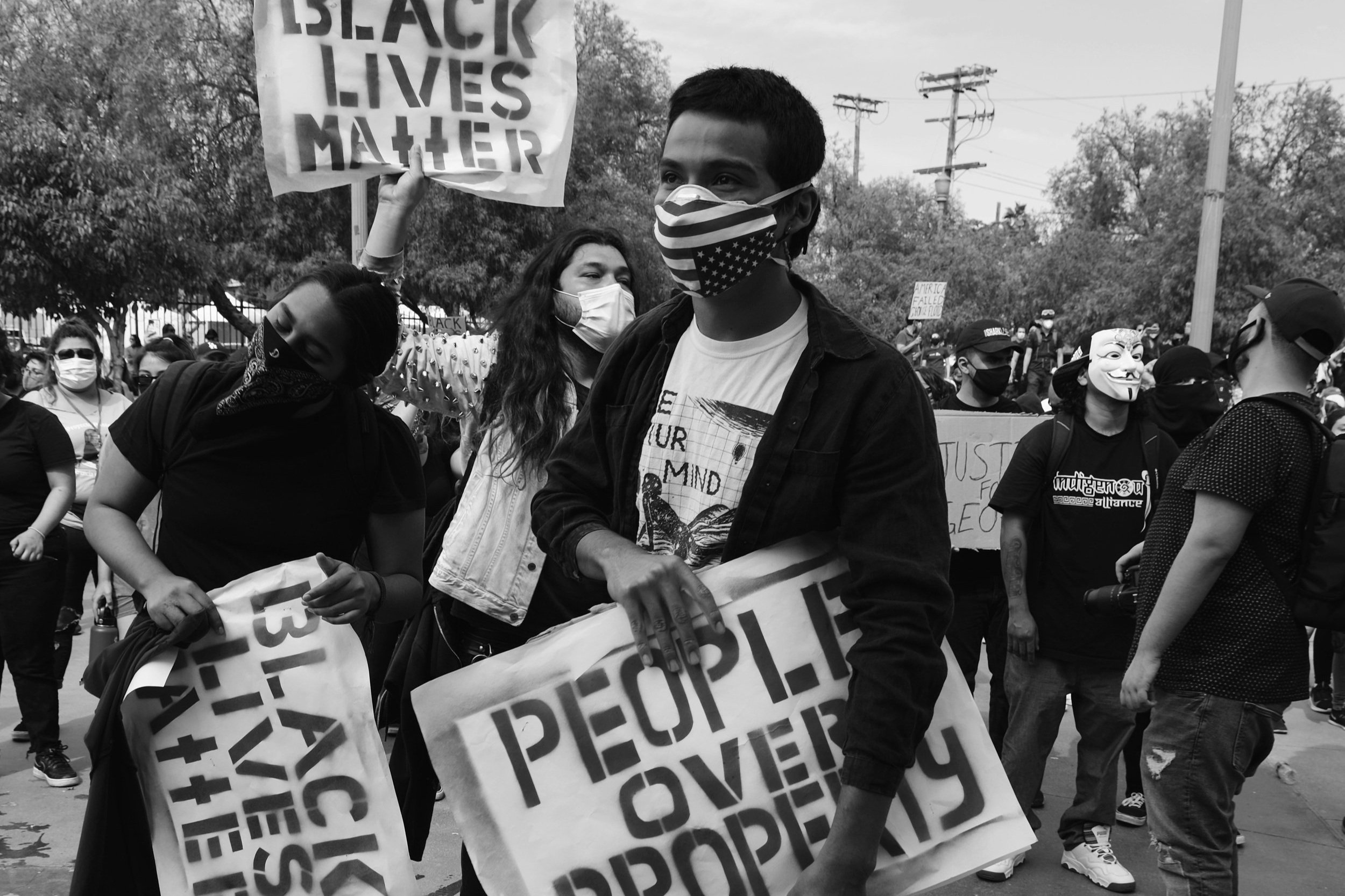Politically erect: How Gen Z navigate relationships in a polarised era
As general elections approach in the UK and US, Honey Wyatt investigates how the political divide is shaping Gen Z’s approach to dating and relationships.
Notoriously dubbed the snowflake generation, Gen Z has gained a reputation for being easily offended. Don’t like Taylor Swift? You’re over. Drink normal dairy milk? Murderer. Disagree with our politics? Milkshake in the face.
Take a look at any comment section on social media and it would have you believe Gen Z wouldn’t touch someone with a different political opinion to them with a barge pole.
But as the UK and US general elections fast approach, how are politics impacting our relationships with friends, at work, or at home? Is there room for disagreement, or are Gen Z steering clear of becoming romantically involved with anyone with views different to their own?
Gen Z's political preferences in relationships
When it comes to dating, Gen Z cares more about political affiliation than previous generations, suggests Alex Fellipelli, founder of Similar Souls and Lefty, dating apps with the mission to connect “like-minded people”.
“Gen Z, having grown up in a highly polarised and digitally connected environment, shows a strong inclination towards dating within their political spectrum,” he tells Sextras.
A March 2024 survey by Similar Souls and Lefty* revealed nearly three quarters (73%) of people would prefer to have a serious relationship with someone with the same political affiliation as them.
Of all generations surveyed, Gen Z were the most likely to care about potential partners’ politics: just 20.9% of 18-24 year olds reported being indifferent to their partner’s political position, as opposed to 25.2% of 53-60 year-olds.
And it makes sense that Gen Z are more likely to care about this than previous generations, Fellipelli argues: “Dating across the political spectrum is increasingly challenging: polarisation has created groups with a set of values that are diametrically opposed to each other. This polarisation tends to be exacerbated by media and social media influence, by promoting echo chambers.
“In such a polarised situation, dating someone who does not align with your own values becomes unthinkable since they are completely opposite to your own.”
Podcast: Will You Take Me As I Am?
Why Gen Z struggles with political criticism
And who can blame us? As Felipelli suggests, we’ve not only grown up in an era of incessant political unrest but oversharing is rife, people!
On either end of the political spectrum, people hold deeply negative views of those in opposition. A 2022 survey by Pew Research Centre found 62% of US Republicans have an unfavourable view of Democrats (up 41% since 1994) and 54% of Democrats feel equally as perturbed by Republicans (up 37% in the same time frame).
Most Sextras followers seem to carry this distrust into dating: 64.3%* of you said you wouldn’t date someone on the other end of the political spectrum and 64.3% of you said you had never done so (okay, consistency).
Meanwhile politics have become evermore perceived as inextricable from our morality and identity – which only exacerbates our distrust of those with differing opinions.
Politics in dating profiles
One Sextras reader cite this as the reason they don’t date across the political divide. “Politics indicate for me your ethical/moral beliefs, I think it would be unfair on both me and the other person to ever even indicate that I would be happy to back down on any of my core beliefs. When it comes to building a life together I think you have to agree on the fundamentals,” they say.
And god forbid we would simply have those opinions and keep them to ourselves. In the age of the internet, all aspects of our political opinion are available to everyone to see and weigh in on. Most dating apps have the option to display your political affiliation on your profile, which some of the more passionate among us choose to make use of – though some Sextras followers seem to agree this is an ick.
“I would not match with anyone that says conservative on their profile. I’m not a big fan when people say ‘not political’ either. Putting liberal is a plus,” says one follower when asked if they’re turned off by people showcasing their politics on their dating profile.
“Politics indicate your moral beliefs; when it comes to building a life together you have to agree on the fundamentals”
Another follower suggests it can be intimidating to engage with someone who uses Hinge or Tinder as their political sounding board. “If you are not someone who feels strongly enough about a political topic that you feel the need to mention it on a dating app (which is meant to act as a bit of a snapshot to the person’s personality) it can be quite intimidating to engage in a conversation and get to know someone who is clearly very passionate about something you may feel that you know nothing about,” they say.
For those who aren’t so blatantly out and proud on dating apps, our political opinion is likely as easily jigsaw-pieced together elsewhere on the internet, where our next suitor has likely devoured every crumb of information about us before we’ve even met.
This way you never have to engage with someone with a different opinion to you ever! You can simply swipe left on the self-confessed Tory and never need to be confronted by another opinion again. Or swipe downwards on the problematic TikTok, and you need only to watch the stories of people who will “uplift” you.
I am, of course, being cynical, but maybe starting a relationship with someone whose opinions don’t align with yours is a recipe for disaster?
Gen Z on dating with different political views
For relationship expert and author, Bethany Nichole, dating someone with an opposing political opinion is not worth the energy. “I usually say no individual feature such as politics, religion, etc. is a complete barrier unto itself, but more so lately it seems politics is fast approaching that territory,” she tells Sextras.
“Of course, we have a lot of free will in relationships, so we can bend and contort ourselves into most, but is that how we really want to live? Beginning a relationship with someone who has aligned political, religious, philosophical, or otherwise viewpoints as you is going to make for a smoother and longer-lasting relationship experience.”
Unfortunately, real life isn’t always reflective of the online world, so sometimes we do have to interact with people with other opinions to ours.
One Sextras follower viewed purposely avoiding dating someone because of their political beliefs as reductive. “If someone says ‘would never kiss a Tory’, I’d infer they are shallow and probably lack the ability to take criticism of beliefs. Your political beliefs should be detached from their personality,” they stated.
“Everyone has a million possible reasons for supporting something, don’t label all people disagreeing with you as therefore inherently different in morals to yourself.”
“Beginning a relationship with someone who has aligned political, religious, philosophical, or otherwise viewpoints as you is going to make for a smoother and longer-lasting relationship experience”
Another pointed to the fact that they had dated someone with different political opinions to them, but said they often clashed. “We had a lot of arguments about it. I felt very personally connected to some of my views while he saw politics more as a fun debate, devil's advocate type thing.”
Background and politics: How identity shapes relationship choices
In reading responses from our followers, I couldn’t help but wonder how our own identity plays into who we choose to date based on their politics. It’s easy enough to view politics as disconnected from morals and a “fun” debate when your own rights and freedoms aren’t directly being put at risk by your own politics.
But when a political party advocates for removing healthcare and social mobility for trans people, people of colour, or migrants (not to mention offering aid for those abroad) and that impacts you, it’s likely more difficult to view morality and politics as separate.
This was evident in a poll earlier in 2024, which found the political divide is increasingly gendered for under 30s. Men in the UK, US and Germany are far more likely to identify with conservative values than women, who are more left-leaning. And Reform UK, the party currently polled to gain the second largest majority of the votes in the UK at the 4 July general election, is attracting “more younger supporters than the Conservatives, with particular backing among men”, the Guardian reported last week.
It’s also evident in the extent of privilege checking on the internet. Gen Z content creator Unjaded Jade recently faced criticism on social media after she expressed that she didn’t know the difference between left and right wing politics until she was 18.
“It’s insanely privileged to live under this guise that she calls ignorance and to have parents that didn’t vote,” @santandestiny said in response to her video. “It doesn’t take you to go abroad to be a decent person and talk about politics.”
The discourse surrounding Unjaded Jade goes to show that if relationships aren’t a space where political discussion can thrive, there is little space where it can. If someone as constantly online as a literal content creator can’t come across political education before the age of 18, surely there’s a problem there?
The importance of discussing politics in relationships
We need to make more space for political discussion in our relationships as a whole, argues one reader who has dated someone with different political opinions to them. “We have debates and clash on certain topics, but ultimately as long as there isn’t a massive gap between humanitarian values then the conversations feel healthy and fruitful,“ they describe.
They even went so far as to suggest that relationships with those with different views to ours could be healthier: “In some ways a partnership/friendship/relationship with opposing views is far healthier and has a more positive impact on society than a relationship where both partners feel the same about everything and create an echo chamber of thought, making it harder to ever view another perspective and understand where it may come from.” Keep your friends close but your enemies closer, I guess?
Research shows that Gen Z genuinely encourages political conversations, if not apparent online. A study from May 2024 shows 59% of Gen Z advocate for respectful socio-political discourse at work – more than any other generation. However, Gen Z is also the most likely generation to have fallen out with someone about politics at work, as 24% say they have fallen out with a colleague or manager over opposing political opinions.
Perhaps the issue is not that these opposing political opinions exist, then, or that we have (voluntarily or not) relationships with people on the other end of the spectrum. Maybe it’s that we don’t know how to have disagreements with our nearest and dearest, precisely because these conversations hold so much weight for ourselves and the world around us?
That’s a lot of pressure to put on ourselves and our loved ones, when you really stop to think about it. So what if we’re snowflakes – we’re only that way because of the world we’ve been brought into.
Expert tips: navigating political discussions with your partner
When approaching conversations about politics, what matters is not trying to “cure” other people of their beliefs, but simply finding ways to deal with them. Nicole suggests curiosity is the way to go when discussing politics with a partner.
She says: “Having informed, calm, and curious conversations about your partner's viewpoints can lead to a deeper understanding of them and their beliefs.
“However, the intent of the conversation would need to be explorative, and curious as opposed to harsh or convincing. It's a tough climate to navigate right now, so ensuring the conversation remains calm and knowing when to simply agree to disagree and walk away will be essential.”
Most partners are not going to change their minds over the course of a conversation, Nicole adds, so keep that in mind.
If there’s a chance tensions could run high, it’s important to set boundaries as to how far the conversation can go, advises Cassandra Boduch, chief medical officer at PsychOne.
“Establish boundaries for discussions to prevent escalation and agree on a signal to take a break if emotions run high,” she says.
“Consider setting aside dedicated times for political conversations to maintain a healthy balance. Avoid making it personal or attacking each other's character; focus on common values and shared goals to find areas of agreement.”
Ultimately, you’re in a partnership and so what matters at the end of the day is that you can accept someone for their differences, politics, weird ways of tidying up, and all.
“Emphasise the relationship over the disagreement, acknowledging that differences exist but don't define your connection,” Boduch recommends. “Disagreements are inevitable, but how you handle them can strengthen your bond by demonstrating respect, resilience, and a shared commitment to navigating challenges together.”
* of 6,275 respondents
** of 14 respondents. Follow us on @sextrasworld so you can answer our surveys and improve our journalistic integrity :) x


